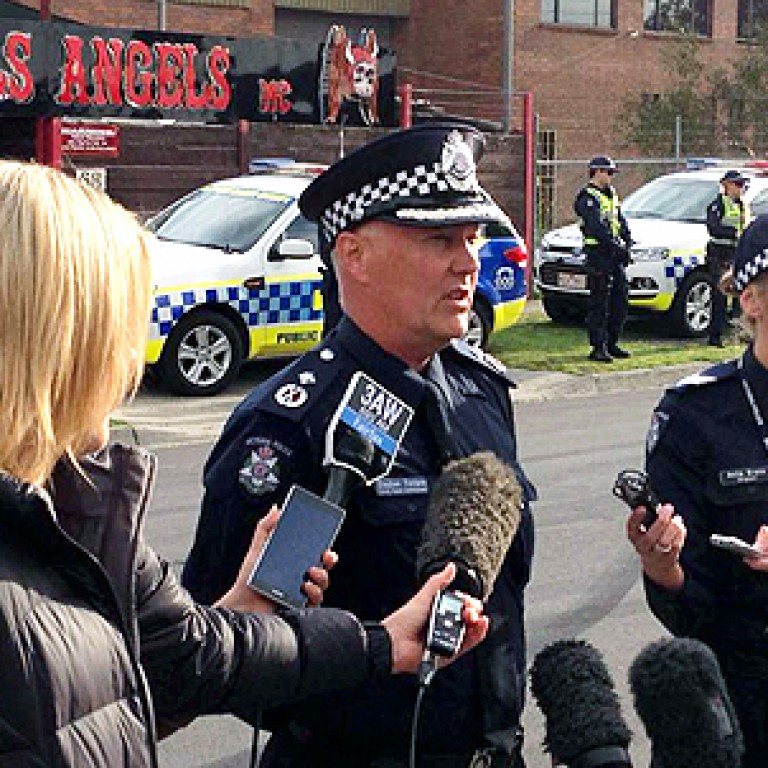
Australian police storm Hells Angels’ hideouts
Australian police seize guns, drugs and cash in crackdown on biker gangs linked to organised crime
More than 700 Australian police swooped on the Hells Angels on Thursday in a series of heavily-armed raids, seizing guns, drugs and cash, as authorities intensify a crackdown on biker gangs linked to organised crime.
In a co-ordinated dawn operation, police stormed 60 clubhouses and properties simultaneously across Melbourne and its surroundings, following an escalating war between rival motorcycle outfits that has sparked a spate of shootings with high-powered weapons.
If they’re affiliated with the Hells Angels, they’ve been targeted
They seized guns, ammunition, explosive materials, drugs and cash.
The crackdown was launched after new anti-fortification laws came into effect on Sunday, which allow police to tear down barriers, cameras and booby traps at club facilities.
“If they’re affiliated with the Hells Angels, they’ve been targeted,” Acting Deputy Commissioner Steve Fontana told reporters, adding that it was the largest operation on a single motorcycle gang in Victoria state’s history.
Thirteen people were arrested, including Hells Angels “sergeant-at-arms” Peter “Skitzo” Hewat. Fontana said the full extent of what had been seized would take time to determine as many of the properties were heavily fortified.
But he admitted that none of the “high-powered military-style weapons” that police had been searching for had so far been found.
“We’re determined to track them down,” he said.
“We’ve located a number of firearms, a large quantity of ammunition, we’ve located drugs, a large quantity of cash, but the investigations and searches are still going (on).”
At one property, so much ammunition was recovered that a truck was needed to take it away.
Fontana added that police were “extremely concerned about these (high-powered) weapons”, which reports said were AK-47s or M1 carbines.
“We’re extremely concerned about the intel we’ve got about the tensions and the intentions of these clubs, and so we thought it necessary to make a pretty strong stance.”
Recent incidents involving biker gangs in Melbourne have included a tattoo parlour being sprayed with bullets, makeshift bombs – which did not explode – thrown at a gym, and shots fired at a Hells Angels clubhouse.
Biker gangs linked to organised crime, particularly drugs, are a growing problem across Australia, with a mass brawl on the Gold Coast last month prompting Queensland police to vow to kick them out of the state.
As part of that pledge, new laws are being drafted in Queensland to ban motorcyclists riding in groups of three or more to stop them using numbers to intimidate, while 50 extra police have been put on Gold Coast streets.
Earlier this year, police launched a series of similar dawn raids across Sydney targeting outlaw motorcycle gangs, seizing firearms, explosives and drugs.
New South Wales state has already banned motorcycle gang members from owning or operating tattoo parlours and barred them from wearing their colours at venues in Sydney’s red-light area of Kings Cross after a spate of drive-by shootings last year.
Experts say the biker violence stems from turf wars over drug distribution, particularly methamphetamine or “ice”. The gangs are also allegedly involved in the distribution of firearms and explosives, with links to Balkan and Asian organised crime groups.
Australia’s worst outbreak of biker violence was a 1984 shootout between the Bandidos and Comancheros in the car park of a Sydney pub, in which six gang members and a 15-year-old girl died.
Tensions also spilled over in a deadly brawl between the Comancheros and Hells Angels at Sydney’s domestic airport in 2009, with one biker bludgeoned to death in front of horrified passengers.
